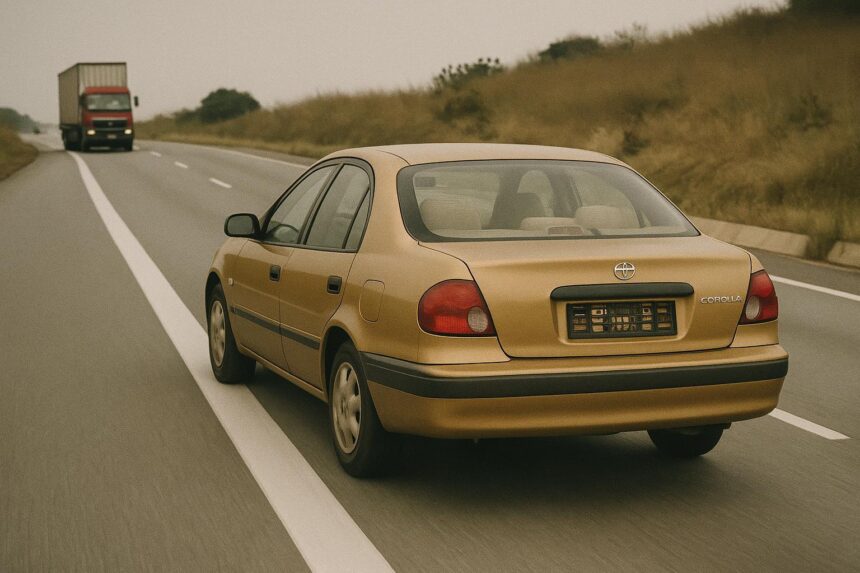A growing urban puzzle
In Brazzaville and Pointe-Noire, commuters increasingly notice SUVs and sedans sliding through traffic with blank bumpers or smudged lettering, a sight once exceptional that now feels routine. Taxi drivers recount daily encounters, while social media circulates images that feed a sense of unease.
- A growing urban puzzle
- Legal framework in force
- Security worries intensify
- Government steps in
- Supply chain bottlenecks
- Military exemptions and realities
- Civil society perspective
- Comparative regional lens
- Economic considerations
- Urban mobility and investor confidence
- Digital registration initiative
- Public outreach campaign
- Enforcement challenges
- Judicial follow-through
- Balancing privacy and order
- Media’s role in perception
- Regional cooperation prospects
- Strategic importance for governance
- Measured optimism
- Looking ahead
Legal framework in force
Congolese traffic law, updated in 2018, declares the absence of a readable plate a Category 3 offence. Police are empowered to impound vehicles and impose fines equivalent to two months of the minimum wage. Plates remain the primary public identifier linking a chassis to its owner.
Security worries intensify
Local outlets such as Les Dépêches de Brazzaville report a cluster of night-time robberies in which victims recall “dark cars without numbers”. The National Gendarmerie confirms four kidnap cases since January matching that description, though it cautions that the sample is too small for sweeping conclusions.
Government steps in
Interior Minister Raymond Zéphyrin Mboulou told the press in March that “the state will tolerate no anonymity on public roads”. A joint task force combining police, customs and military police has been instructed to mount surprise checkpoints across major corridors during the second quarter.
Supply chain bottlenecks
Officials acknowledge an unintended driver: scarcity of aluminium blanks used for modern retro-reflective plates. Import data from the Ministry of Commerce show deliveries falling 23 percent in 2022 after shipping delays at Pointe-Noire’s port. Temporary transit permits, often paper-based, are now more visible on windscreens.
Military exemptions and realities
Congo’s defence fleet traditionally circulates with coded series beginning CGF, yet some operational units employ plain vehicles for discretion. Colonel Alain Obili states that such cars carry internal tags readable by handheld scanners, reassuring that “disciplinary action follows any misuse”.
Civil society perspective
The watchdog group Observatoire Anti-Corruption argues that opaque exemptions, even if legal, blur lines for civilians. Coordinator Brigitte Massengo urges clearer public communication, saying the aim is not to hinder security forces but to reduce the space in which criminals can imitate them.
Comparative regional lens
Neighbouring Gabon confronted a similar trend in 2019 and curbed it by issuing QR-coded plates manufactured locally. Analysts at the Central African Policy Centre suggest Brazzaville could replicate the model, citing the advantage of regional standardisation for inter-state police cooperation.
Economic considerations
Car dealers admit that unofficial fees surrounding registration still discourage compliance. A 2021 IMF technical report estimated that informal payments may add 15 percent to the official cost. Fiscal authorities have since digitalised appointments, cutting waiting times from three weeks to five days.
Urban mobility and investor confidence
Ride-hailing operators engaged in pilot programmes in the capital stress that traceability is critical for customer uptake. One executive at Yassir Congo notes that without visible plates, insurance underwriting becomes costlier, subtly affecting the wider push for diversified foreign investment.
Digital registration initiative
The Ministry of Transport will launch a smartphone application this July, enabling officers to scan plates and instantly verify tax status. By 2025, all new registrations should embed an NFC chip. Development partners from the African Development Bank back the project with a five-million-euro grant.
Public outreach campaign
State television is running messages that blend enforcement reminders with road-safety tips, aiming to shift the conversation from fear to civic responsibility. Sociologist Jean-Pierre Ndioko observes that framing unmarked driving as a social ill, rather than pure crime, resonates with younger audiences.
Enforcement challenges
Urban police unions underline manpower constraints. With just over 3,000 traffic officers nationwide, according to the 2022 Security Sector Review, checkpoints cannot blanket every artery. Authorities rely on randomised patrol algorithms and community hotlines to optimise visibility.
Judicial follow-through
Prosecutor-General André Oko Ngakala reports that 78 cases of plate-related offences reached court last year, up from 41 in 2021. Convictions stood at 82 percent, indicating a judiciary receptive to deterrence. Fines collected feed a dedicated road-safety fund.
Balancing privacy and order
Human-rights lawyer Aurélia Tchibota cautions that identity checks must respect constitutional safeguards. She praises recent guidelines requiring officers to explain the legal basis of stops, describing them as “a signal that security and civil liberties can co-exist”.
Media’s role in perception
Prime-time talk shows now host transport officials alongside victims’ families, creating a feedback loop rarely seen a decade ago. Communication scholar Davy Malonga believes transparent dialogue reduces rumours that could otherwise erode confidence in official statistics.
Regional cooperation prospects
The Economic Community of Central African States is drafting a protocol on mutual recognition of vehicle data. Diplomats in Libreville say Congo has lobbied for shared databases that would aid in tracing cross-border car theft rings operating from Kinshasa to Luanda.
Strategic importance for governance
For President Denis Sassou Nguesso, restoring full vehicular traceability dovetails with broader governance objectives, including digital transition and public-sector modernisation. Observers note that efficient plate management signals administrative capacity, a metric watched closely by multilateral lenders.
Measured optimism
Early April operations impounded 217 unwp-signup.phped vehicles in three days, according to police communiqués. While residents report fewer sightings on main boulevards, experts remind that sustained success hinges on supply-chain resilience and continued public engagement.
Looking ahead
If logistics hold and cross-agency coordination endures, Congo-Brazzaville could turn a worrisome trend into a case study of adaptive governance. The unfolding campaign offers a window on how a resource-rich nation balances security imperatives with the everyday freedoms of its citizens.






















